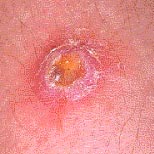 Chronic epicondylitis (tennis elbow) is a painful condition with few treatments. It’s caused by overuse of the extensor muscles of the forearm.
Chronic epicondylitis (tennis elbow) is a painful condition with few treatments. It’s caused by overuse of the extensor muscles of the forearm.
Researchers in Germany tested whether leech therapy might provide symptomatic relief. Continue reading Leeches to treat tennis elbow →
 In this time of MRSA (methacillin-resistant Staph aureus) skin infections, Medscape reviews 3 CAM wound treatment options.
In this time of MRSA (methacillin-resistant Staph aureus) skin infections, Medscape reviews 3 CAM wound treatment options.
Here are the highlights. Continue reading Maggots, and leeches, and honey, oh my! →
 Two reports from the University of Duisburg-Essen in Germany support the role of leeches (Hirudo medicinalis) to treat osteoarthritis of the knee. The first included 16 patients who, in addition to other treatments, received four medicinal leeches on the inflamed knee for 80 minutes. The response was compared to 6 patients given conventional pain treatment. The second study was of similar design in 51 patients.
Two reports from the University of Duisburg-Essen in Germany support the role of leeches (Hirudo medicinalis) to treat osteoarthritis of the knee. The first included 16 patients who, in addition to other treatments, received four medicinal leeches on the inflamed knee for 80 minutes. The response was compared to 6 patients given conventional pain treatment. The second study was of similar design in 51 patients.
Continue reading Blood-sucking leeches treat osteoarthritis →
Complementary and Alternative Medicine: Fair, Balanced, and to the Point
 Chronic epicondylitis (tennis elbow) is a painful condition with few treatments. It’s caused by overuse of the extensor muscles of the forearm.
Chronic epicondylitis (tennis elbow) is a painful condition with few treatments. It’s caused by overuse of the extensor muscles of the forearm. In this time of
In this time of  Two reports from the University of Duisburg-Essen in Germany support the role of leeches (Hirudo medicinalis) to treat osteoarthritis of the knee. The
Two reports from the University of Duisburg-Essen in Germany support the role of leeches (Hirudo medicinalis) to treat osteoarthritis of the knee. The